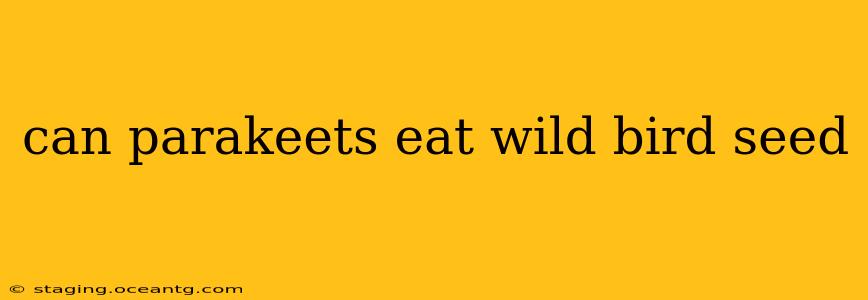Parakeets, those charming and vibrant little birds, are beloved companions for many. Providing them with a nutritious and balanced diet is crucial for their health and happiness. A common question among parakeet owners is whether they can safely consume wild bird seed. The short answer is: it's not ideal and should be avoided as a primary food source. While a tiny amount occasionally might not cause harm, relying on wild bird seed as a staple in your parakeet's diet can lead to several health problems.
Why Wild Bird Seed Isn't Suitable for Parakeets
Wild bird seed mixes are formulated to appeal to a wide variety of bird species, with varying nutritional needs. This means the blend often lacks the essential nutrients and vitamins crucial for a parakeet's well-being. Parakeets, like all birds, require a diet rich in specific components for optimal health. Wild bird seed often contains:
- High Fat Content: Some seeds in wild bird mixes are very high in fat, which can lead to obesity and liver problems in parakeets.
- Lack of Essential Vitamins and Minerals: The mix often lacks the vital vitamins and minerals crucial for a parakeet's immune system, bone health, and overall development.
- Inappropriate Seed Types: Certain seeds found in wild bird seed mixes can be difficult for parakeets to digest or even toxic.
- Potential for Contamination: Wild bird seed can sometimes be contaminated with pesticides, bacteria, or molds, posing health risks to your pet.
What Should Parakeets Eat Instead?
A healthy parakeet diet centers around a high-quality parakeet seed mix. This specialized mix provides the appropriate balance of nutrients, including essential fatty acids, proteins, vitamins, and minerals. In addition to seed mix, you should supplement their diet with:
- Fresh Fruits and Vegetables: Offer a variety of fresh fruits and vegetables daily, such as apples, carrots, broccoli, and spinach. Introduce new foods gradually to observe for any allergic reactions.
- Parakeet Pellets: Pellets offer a complete and balanced diet, providing essential nutrients often lacking in seeds alone.
- Occasional Treats: Small amounts of cooked pasta, millet spray, and even a tiny piece of cooked chicken can be given as occasional treats in moderation.
What if My Parakeet Accidentally Eats Some Wild Bird Seed?
A small amount of wild bird seed is unlikely to cause significant harm, but it shouldn't become a regular occurrence. Monitor your parakeet for any changes in behavior, such as lethargy, diarrhea, or loss of appetite. If you notice any unusual symptoms, consult an avian veterinarian immediately.
Are There Any Seeds Parakeets Can Eat?
While wild bird seed mixes are unsuitable, some individual seeds found in those mixes can be offered sparingly as part of a varied diet. These include:
- Millet: A common and safe treat in moderation.
- Nyjer (Thistle) Seed: Can be offered sparingly.
- Sunflower Seeds (in moderation): High in fat, so should be given as occasional treats only.
It is crucial to remember that moderation is key. Even seeds considered safe shouldn't make up a significant portion of your parakeet's diet.
Frequently Asked Questions (FAQs)
Can I give my parakeet leftover wild birdseed from my feeder?
No, it's not advisable. Leftover wild bird seed can be contaminated with bacteria, parasites, or mold.
My parakeet seems to enjoy the wild bird seed. Is it okay to let him eat it?
While your parakeet might show interest, it's not nutritionally beneficial and may pose health risks in the long run. Focus on providing a balanced diet formulated for parakeets.
What are the signs of nutritional deficiency in a parakeet?
Signs can include lethargy, feather loss, dull plumage, weakened immune system, and digestive issues. Consult an avian vet if you notice any of these symptoms.
By providing your parakeet with a balanced and species-appropriate diet, you ensure they thrive and live a long, healthy life. Remember to always consult with an avian veterinarian for any concerns about your pet's health and nutrition.
